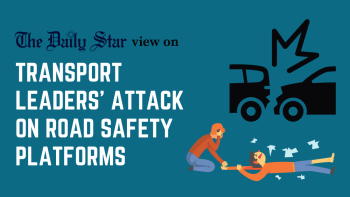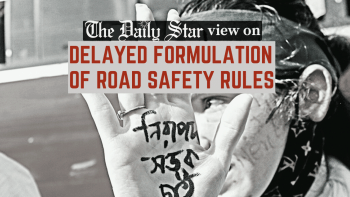Is this the best the BRTA can do?

The Bangladesh Road Transport Authority (BRTA) has prepared a draft Motorcycle Operation Control Guideline that, if approved, will thenceforth govern the use and purchase of motorcycles, the vehicle responsible for the highest number of road crashes in recent years. The draft, according to a report by this daily, has recommended a number of restrictive measures, including disallowing purchase of motorcycles without a driving licence, requiring a licence to get a motorcycle registered with the BRTA, disallowing carrying a pillion passenger on highways, setting speed limits, etc. The purpose, we're told, is to control operation of bikes and curb road accidents.
The guideline is perhaps the first policy response to the unique problem caused by the unregulated use of motorcycles. It is, we must admit, an improvement on misguided calls for a blanket ban on motorcycles – particularly from quarters linked with bus transport associations, allegedly to cut competition. Instead of clamping down on bikers in general, it recommends control measures in four stages – at the production or import level, at the point of sale, at the point of registration, and during use of motorcycles – thereby distributing responsibilities among all stakeholders. As far as intentions go, the draft seems to be in the right direction. But whether it will be effective in preventing crashes is a different matter.
Even if we disregard the elephant in the room – the lack of ability of the government to implement such a guideline – we must say that the very idea that accidents happen only because of the lack of a licence/registration, or driving skills, is a narrow view of the problem. It ignores other contributing factors, such as speeding by other vehicles, the culture of violating traffic rules, the chaos in the transport sector, etc. Where's the initiative to fix these persistent problems? Why is nothing being done about improving the capacity and services of the BRTA? Given how bad the situation is – with at least 7,713 people killed in 6,829 crashes in 2022 – a guideline can only be part of a central road safety policy which has been woefully missing.
Even that guideline suffers from narrow thinking. For example, it recommends that bike producers, assemblers and importers will provide at least two days' safety training to buyers before handing over bikes. This laughable approach to training – putting the burden on the supply side of bikes – throws into sharp relief the BRTA's own inadequate training infrastructure. The fact is, the BRTA itself needs regulating before it can become a reliable regulator. It needs to start implementing the Road Transport Act properly before it can be expected to properly implement any guideline.
Bangladesh, as one of the most unsafe countries for travellers, has reached a point where it must show results – not cosmetic initiatives. While the draft guideline fills the vacuum in terms of regulating the operation of bikes, it cannot reduce road crashes unless we initiate wider reforms, including ridding the BRTA of corruption and irregularities, eliminating conflicts of interest in the policy circles, disciplining the unruly transport associations, and building a functional traffic management system.


 For all latest news, follow The Daily Star's Google News channel.
For all latest news, follow The Daily Star's Google News channel. 










Comments